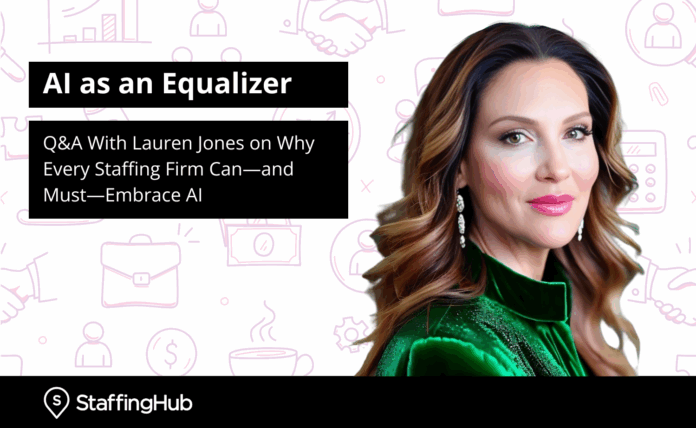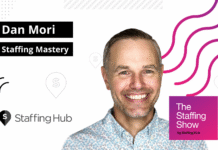
In an industry where technological adoption often separates market leaders from those struggling to keep pace, Lauren Jones, founder and CEO of Leap Advisory Partners, believes AI is the great equalizer, giving million-dollar firms access to the same powerful tools as billion-dollar enterprises. But despite this unprecedented opportunity, she continues to encounter leaders who haven’t fully grasped the urgency of the moment.
As a recognized voice in staffing technology, Jones has spent the better part of three years speaking around the country, highlighting AI’s transformative potential for staffing firms of all sizes. One such opportunity was at this year’s Avionté CONNECT conference, where she led the session, “Supercharge Your Staffing Firm with AI.”
In our conversation, Jones cuts through the noise and hesitation surrounding AI implementation, offering practical guidance for firms ready to move from skepticism to strategic adoption. From understanding what problems AI can actually solve to building cultures that embrace rapid change, her insights reveal why the firms that act now will lead tomorrow’s market — and what happens to those that don’t.
Q. You’ve facilitated so many tech conversations in staffing. What’s the message you’re most excited to bring to CONNECT this year?
Lauren Jones: Accessibility, particularly when it comes to AI. You know, this is my third year keynoting the country on AI, and I still find myself surprised at individuals, leaders, and firms that are not quite taking it seriously. It is a game changer.
It’s the first time in my career, and in my lifetime really, where the million dollar firm and the billion dollar firm have access to the same technology at the same cost. This is the great equalizer.
What I hope to bring is a sense of accessibility, that this is for anyone and everyone, regardless of your technical capabilities. I want everybody to have access to it, and I want everybody to have a sense of urgency about it.
Q. In your talk, you’re covering ways agencies can “supercharge” their operations with AI. What’s one practical use case that staffing leaders should start experimenting with right now?
LJ: That answer is going to be different for everybody. When agencies come to me, saying, “We have to implement AI,” I am here for you implementing AI. I’ve got my pom-poms out, but we need to know what problem you’re trying to solve for.
The one thing that I want agencies to do is send out a single sentence survey. One sentence: “What gets in your way everyday?” Understand from the recruiter’s perspective, the salesperson’s perspective, your branch leader, your on-site, etc., what gets in their way every day. Then you have a perfect, amazing roadmap in front of you to solve problems within the organization.
Q. You work with agencies every day to optimize their tech stacks. Where do most agencies go wrong when implementing new tools — especially AI-driven ones?
LJ: I think number one is expectations. This is not the Staples Easy Button. It’s not going to fill your orders for you. I’m telling you this right now: It’s not going to fill your orders for you.
It will recruit people for you and it will help you be more efficient and more effective. It’ll help you do more with less — all of the little fuzzy phrases that we have about technology and AI.
But I want agencies to walk into an implementation, whether it’s automation or AI, with a clear picture of the problem that they’re trying to solve for, the desired outcomes, how they’re going to manage it, and how it will be held accountable. How are you going to hold AI accountable, or how are you going to hold those that leverage AI accountable for adoption or proper utilization.
Walk in with a clear picture of what you intend to accomplish. Where I see firms go wrong is failure to plan.
Q. A lot of teams feel like they’re drowning in new tools and processes. How do you help them actually adopt and use new tech — instead of just pushing through resistance?
LJ: I think you said it right there. Particularly now, with as fast as technology is moving, training cannot be a one hit wonder. It’s not, “I’m going to sit you down in front of a computer screen for one hour out of time to have you go through some 1978 training video.”
You have to ingrain change and rapid change acceptance into your culture. You need people to eat, sleep, and drink change. Things are moving so rapidly that if you don’t build a culture of change acceptance, change readiness, and change willingness, you are going to be left behind.
The firm that creates agility through good change acceptance, change readiness, and change management is the firm that will lead. Look at Insight Global — Bert Bean’s done an amazing job with that firm creating a culture of change acceptance. They’re always on the ready, and they’ve created agility for a very, very large firm.
I want everybody to be able to do that. But it is a diligent, repetitious, well thought out commitment.
Q. Your LinkedIn profile mentions how you help make firms “more efficient and more human.” What does that look like in practice with AI?
LJ: I think we have to understand what a job seeker’s expectation is. Looking for a job stinks. You’re seeking out the acceptance of strangers with a piece of paper that was invented in 1482. It’s a daunting, emotional, and very lonely experience to look for a job.
We’ve got to think, “Where are the points within the experience that we want to make meaningful?” For example, I had a professional services firm that said, “We’re white glove. We don’t want automation doing anything. We don’t want a bot on our site.” But what you’re missing out on is being able to capture the attention of that individual, then leverage a bot to get them in front of a human faster than they would if there wasn’t a bot on the site.
I say this all the time, I think I’ve said it on every podcast: “The firm that wins is going to be the one that provides a choice of journey.” So if I’m a Gen Z, I will talk to a bot 16 minutes longer than I will a human being. If I’m a millennial, take that conversation to my text messages because I live and breathe text messages. If you’re a Gen X-er, like myself, please put it in my email because I live and die by email.
So the firm that wins is going to have that choice of journey, a choice of communication methodology or medium. You’re going to have a way for every generation. You have to think about the generation that you’re trying to attract and the talent that is naturally attracted to your brand or your vertical.
And don’t have misconceptions. Go into it with an open mind. Don’t have preconceived notions about what technology can and can’t do, because you can create a more human, more connected, and a faster experience.
We used to have the metric “from view to apply.” Let’s have a metric that’s “from view to check.” How can we reduce the time it takes from the first time they engage with your brand to the time that we’re able to give them their first paycheck? That’s where we start making human and meaningful, quick and expeditious experiences, which is all people are looking for in a job.
Ask anybody in the job seeking process. Stop with the 1,500 interviews. Stop with a black hole resume. Stop with the ghosting. All they’re looking for is connection.
We’ve made a $700 billion industry out of being a middle man. So how do we be the best middle man ever and make the job seeking experience short and sweet?
Q. When you’re working with leaders who are hesitant about AI, what helps them shift from skepticism to strategic adoption?
LJ: A sense of urgency. At the beginning of this year, I was in a room full of agencies, some of them of a very, very healthy size, and I said, “How many of you have implemented AI?” Not a single hand went up.
And this is my third year keynoting on AI, so I was dumbfounded, because as much as I have all of these conversations, there are still people that aren’t taking this seriously. So I am here to tell you that if you don’t adopt it, you will get left behind.
This is the internet all over again. You’ve got to hop on the train and get with it or you are going to be left behind and you won’t be able to keep up. AI is training us for rapid change.
Q. What’s one recent tech “aha moment” you’ve had — whether from a client, podcast guest, or your own work — that made you rethink how we use AI in staffing?
LJ: I went in with preconceived notions about what it could and couldn’t do. And now I go in thinking it can do anything. Anything that I give it correct direction to do, it can do. I think I’ve built 27 apps now just through vibe coding. We are getting supercharged, superhuman powers with some of these things. I’m able to get more done in a day leveraging some of these tools.
The hardest part is getting started, and you just have to jump into the cold water. It’s going to be cold for a hot minute, and you’re going to be confused, but you’re going to get used to it. Then you’re going to get excited, and then you’re going to say, “Oh, my gosh, what if it could do this?”
I hear that AI is going to stifle our creativity, it’s making us dumber, it’s doing all of these things… But it makes me think entirely differently. I am way more creative.
I had a failed software business years ago. This was a side hustle that I had when I was still in corporate America. I had paid so much money to a software engineer to build just a proof of concept, not even the full product. Now, I’ve built a proof of concept in three hours, a full app.
So for agencies that are thinking about it, are scared of it, or think it’s going to ruin the business — you just have to take the step. I think we can bridge that gap just through action. The firms that are ahead of the game are the ones that are just trying things, experimenting.
“Is it applicable here? Could I make this faster?” Interrogate your processes all the time and think about what takes too much time. Those are the perfect areas of opportunity for AI or automation, or a combination thereof.
Q. Where do you see the staffing industry heading over the next three years — particularly when it comes to technology and automation? What’s one trend you think people are underestimating?
LJ: There’s this new class of learning models, the small learning models (SLMs), and the digital worker. I think we’re wildly underestimating what that setup is going to look like.
LLMs, they take a lot of energy and they can be inefficient. I think the SLM is going to be this really concise, digital worker that we’re able to build. It doesn’t need to draw from this big, big learning model. We’re going to be more mindful about how much energy it takes to run these things and how efficient we’re being.
I think we’re undervaluing the power of the digital worker setup, the agent setup. Every major ATS and CRM platform is moving to an agent model, where you’re going to have a sales agent, a recruiting agent, and a pre-screening agent. And we’ve built our own agents internally to take all of our past discovery and look for repetitious questions. Because everything is pretty bespoke that we do, particularly when you’re doing discovery. But AI’s the perfect application to go find repetition in a complex process, then build an agent on that.
So I think we’re undervaluing how businesses are going to be set up in the future and what our role will be. You’re going to have recruiters that are managing teams of digital workers. And managers might have a brand new position — I just got a VP of AI strategy and digital workers. I wish I saw more of that, because I think that’s the future, and we’re undervaluing the power of the digital worker.
Q. What inspired you to take the stage at Avionté CONNECT — and has anything stood out during the event that’s really stuck with you?
LJ: Well, first of all, I love the Avionté family. They’re just good people. They’ve built a great system. We have built our brand on being a neutral partner that works for the customer and does what is best for the customer, and Avionté is a great solution.
I come to CONNECT because I love to watch the technology continue to expand. I love to watch the customer base continue to expand. Just as a partner, it’s amazing to watch that and be a part of that.
And I come back every time for the relationships. I am an absolute obsessive nerd about technology, but I am the first person to say that I want a handshake. I want to see people face-to-face.
AI is going to have its place, and these types of events are going to become more and more powerful in this digital age. So I come back every year for the people, the technology, and the combination thereof.
For more insights on change management and technology investments in the staffing industry, connect with Lauren Jones and Leap Advisory Partners. Or tune in to our conversation with Lauren on The Staffing Show.
Interested in attending CONNECT 2026? Follow Avionté for updates.







